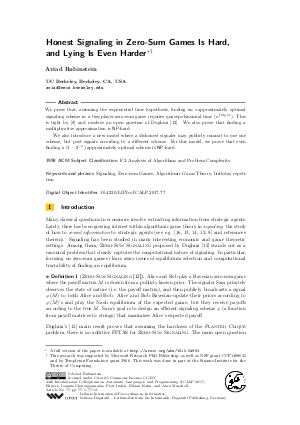Honest Signaling in Zero-Sum Games Is Hard, and Lying Is Even Harder
Author Aviad Rubinstein
-
Part of:
Volume:
44th International Colloquium on Automata, Languages, and Programming (ICALP 2017)
Part of: Series: Leibniz International Proceedings in Informatics (LIPIcs)
Part of: Conference: International Colloquium on Automata, Languages, and Programming (ICALP) - License:
 Creative Commons Attribution 3.0 Unported license
Creative Commons Attribution 3.0 Unported license
- Publication Date: 2017-07-07
File

PDF
LIPIcs.ICALP.2017.77.pdf
- Filesize: 0.58 MB
- 13 pages
Document Identifiers
Subject Classification
Keywords
- Signaling
- Zero-sum Games
- Algorithmic Game Theory
- birthday repetition
Metrics
- Access Statistics
-
Total Accesses (updated on a weekly basis)
0PDF Downloads0Metadata Views
Abstract
We prove that, assuming the exponential time hypothesis, finding an epsilon-approximately optimal symmetric signaling scheme in a two-player zero-sum game requires quasi-polynomial time. This is tight by [Cheng et al., FOCS'15] and resolves an open question of [Dughmi, FOCS'14]. We also prove that finding a multiplicative approximation is NP-hard.
We also introduce a new model where a dishonest signaler may publicly commit to use one scheme, but post signals according to a different scheme. For this model, we prove that even finding a (1-2^{-n})-approximately optimal scheme is NP-hard.
Cite As Get BibTex
Aviad Rubinstein. Honest Signaling in Zero-Sum Games Is Hard, and Lying Is Even Harder. In 44th International Colloquium on Automata, Languages, and Programming (ICALP 2017). Leibniz International Proceedings in Informatics (LIPIcs), Volume 80, pp. 77:1-77:13, Schloss Dagstuhl – Leibniz-Zentrum für Informatik (2017)
https://doi.org/10.4230/LIPIcs.ICALP.2017.77
BibTex
@InProceedings{rubinstein:LIPIcs.ICALP.2017.77,
author = {Rubinstein, Aviad},
title = {{Honest Signaling in Zero-Sum Games Is Hard, and Lying Is Even Harder}},
booktitle = {44th International Colloquium on Automata, Languages, and Programming (ICALP 2017)},
pages = {77:1--77:13},
series = {Leibniz International Proceedings in Informatics (LIPIcs)},
ISBN = {978-3-95977-041-5},
ISSN = {1868-8969},
year = {2017},
volume = {80},
editor = {Chatzigiannakis, Ioannis and Indyk, Piotr and Kuhn, Fabian and Muscholl, Anca},
publisher = {Schloss Dagstuhl -- Leibniz-Zentrum f{\"u}r Informatik},
address = {Dagstuhl, Germany},
URL = {https://drops.dagstuhl.de/entities/document/10.4230/LIPIcs.ICALP.2017.77},
URN = {urn:nbn:de:0030-drops-74057},
doi = {10.4230/LIPIcs.ICALP.2017.77},
annote = {Keywords: Signaling, Zero-sum Games, Algorithmic Game Theory, birthday repetition}
}
Author Details
References
-
Scott Aaronson, Russell Impagliazzo, and Dana Moshkovitz. AM with multiple merlins. In Computational Complexity (CCC), 2014 IEEE 29th Conference on, pages 44-55. IEEE, 2014.

-
George Akerlof. The market for lemons: Qualitative uncertainty and the market mechanism. The Quarterly Journal of Economics, 84(3):488-500, 1970.

-
Ingo Althofer. On sparse approximations to randomized strategies and convex combinations. Linear Algebra and its Applications, 199:339-355, 1994.

- Yakov Babichenko, Christos H. Papadimitriou, and Aviad Rubinstein. Can almost everybody be almost happy? In Proceedings of the 2016 ACM Conference on Innovations in Theoretical Computer Science, Cambridge, MA, USA, January 14-16, 2016, pages 1-9, 2016. URL: http://dx.doi.org/10.1145/2840728.2840731.
- Umang Bhaskar, Yu Cheng, Young Kun Ko, and Chaitanya Swamy. Hardness results for signaling in bayesian zero-sum and network routing games. In Proceedings of the 2016 ACM Conference on Economics and Computation, EC'16, Maastricht, The Netherlands, July 24-28, 2016, pages 479-496, 2016. URL: http://dx.doi.org/10.1145/2940716.2940753.
- Mark Braverman, Young Kun-Ko, Aviad Rubinstein, and Omri Weinstein. ETH hardness for densest-k-subgraph with perfect completeness. In Proceedings of the Twenty-Eighth Annual ACM-SIAM Symposium on Discrete Algorithms, SODA 2017, Barcelona, Spain, Hotel Porta Fira, January 16-19, pages 1326-1341, 2017. URL: http://dx.doi.org/10.1137/1.9781611974782.86.
- Mark Braverman, Young Kun-Ko, and Omri Weinstein. Approximating the best Nash Equilibrium in n^o^(log n)-time breaks the Exponential Time Hypothesis. In Proceedings of the Twenty-Sixth Annual ACM-SIAM Symposium on Discrete Algorithms, SODA 2015, San Diego, CA, USA, January 4-6, 2015, pages 970-982, 2015. URL: http://dx.doi.org/10.1137/1.9781611973730.66.
- Yu Cheng, Ho Yee Cheung, Shaddin Dughmi, Ehsan Emamjomeh-Zadeh, Li Han, and Shang-Hua Teng. Mixture selection, mechanism design, and signaling. In FOCS, 2015. To appear. URL: http://arxiv.org/pdf/1508.03679v1.pdf.
- Constantinos Daskalakis. On the Complexity of Approximating a Nash Equilibrium. ACM Transactions on Algorithms, 9(3):23, 2013. URL: http://dx.doi.org/10.1145/2483699.2483703.
- Constantinos Daskalakis and Christos H. Papadimitriou. On oblivious PTAS’s for Nash equilibrium. In Proceedings of the 41st Annual ACM Symposium on Theory of Computing, STOC 2009, Bethesda, MD, USA, May 31 - June 2, 2009, pages 75-84, 2009. Full version available at http://arxiv.org/abs/1102.2280. URL: http://dx.doi.org/10.1145/1536414.1536427.
- Irit Dinur. The PCP theorem by gap amplification. J. ACM, 54(3):12, 2007. URL: http://dx.doi.org/10.1145/1236457.1236459.
- Shaddin Dughmi. On the hardness of signaling. In 55th IEEE Annual Symposium on Foundations of Computer Science, FOCS 2014, Philadelphia, PA, USA, October 18-21, 2014, pages 354-363, 2014. URL: http://dx.doi.org/10.1109/FOCS.2014.45.
- Shaddin Dughmi, Nicole Immorlica, and Aaron Roth. Constrained signaling for welfare and revenue maximization. SIGecom Exchanges, 12(1):53-56, 2013. URL: http://dx.doi.org/10.1145/2509013.2509022.
- Yuval Emek, Michal Feldman, Iftah Gamzu, Renato Paes Leme, and Moshe Tennenholtz. Signaling schemes for revenue maximization. ACM Trans. Economics and Comput., 2(2):5, 2014. URL: http://dx.doi.org/10.1145/2594564.
- Russell Impagliazzo and Ramamohan Paturi. On the complexity of k-sat. J. Comput. Syst. Sci., 62(2):367-375, 2001. URL: http://dx.doi.org/10.1006/jcss.2000.1727.
- Peter Bro Miltersen and Or Sheffet. Send mixed signals: earn more, work less. In ACM Conference on Electronic Commerce, EC'12, Valencia, Spain, June 4-8, 2012, pages 234-247, 2012. URL: http://dx.doi.org/10.1145/2229012.2229033.
- Aviad Rubinstein. Honest signaling in zero-sum games is hard, and lying is even harder. CoRR, abs/1510.04991, 2015. URL: http://arxiv.org/abs/1510.04991.
